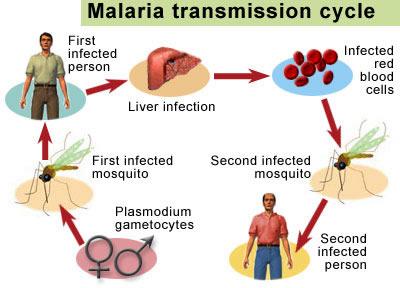
Malaria transmission cycle (Source: www.smeds.org)
The Summer time when there is an infestation of mosquitoes will be a critical time to beware of the Malaria. Experts from Dongguan Center for Disease Control and Prevention issued a reminder to residents that they should be cautious in preventing the infection during the period from June to October when Malaria is more likely to be contracted.
Malaria is an arboviral infectious disease caused by malarial parasites transmitted by the Anopheline Mosquitoes' sting. Infections usually occur in places such as quarries, building sites, afforestation project areas, road construction as well as cultivation and breeding based agricultural areas. There are always thick forest, plants and stagnant backwater in these places where the mosquitoes breed.
According to the analysis of Zhang Qiaoli, the vice director of the Center for Disease Control and Prevention, the peak period for infection with repect to malaria is from June to October. There were infectious cases of Malaria in Dongguan in the past three years, so Malaria control and prevention cannot be neglected. Zhang said that the improvement of health conditions, personal protection and early treatment are important in order to achieve the goal of the elimination of malaria by 2018.
"Cases of malaria in Dongguan are declining year by year," said Zhang. He suggested families to screen their houses or set up mosquito nets to block mosquitoes, or use chemicals to spray mosquitoes and their breeding grounds. As it is the Anopheline Mosquitoe that carries malaria usually come out at night, residents are advised to wear anti-mosquito cream when they go out for walks in parks.
Experts also say that one should seek immediate medical care once the symptom of malarial infection appears. The typical symptom of malarial infection include a reoccurring fever, for example, a fever that comes every one day or at the same period of time for several days, or chills, trembling and sweating in a fever.
(By Tan Jing)
Related News
Photos
More>>trade
market
- Ali Moradi: DG Asiad stadium reaching intern l standards
- The Journey of Danube river-Chinese & Foreign music concert to be staged tonight
- The 12th Dongguan China Shoes to be staged in October
- Emergency alarm system to cover the elderly of empty-nest families
- Dongguan's mayor visits Taiwan seeking cooperation





